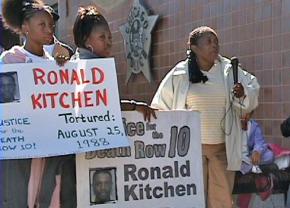A mighty voice for justice
of the Campaign to End the Death Penalty remembers a warrior for justice, who helped save the life of her son and end capital punishment in Illinois.
I WAS sad to hear the news that Louva Bell passed away on October 9. For those who never knew of Louva, she was a woman determined to see her son, Ronnie Kitchen, freed from a wrongful death sentence.
Ronnie was 22 when he was arrested and brought in for questioning at Area 3 headquarters in Chicago. He was beaten by Chicago cops who worked under the command of Jon Burge, who tortured more than 200 African American suspects.
Ronnie's arms were chained to a ring in the wall, and he was beaten with fists, a blackjack and a telephone book. He was told by the officers, "We have ways of making niggers talk." He was beaten so badly in his groin that he had to be treated by a doctor for several months due to "swelling and abrasions." That's how the state obtained a "confession" that was used to convict him and sentence him to death.
Ronnie spent 21 years in prison, 13 of them on Illinois' death row. Along with another torture victim, Stanley Howard, Ronnie helped found and lead the "Death Row Ten," a group of death row prisoners who were tortured by Burge and his men until they confessed. They wanted to bring attention to their wrongful incarceration. The Campaign to End the Death Penalty (CEDP) agreed to be their voice on the outside.

I CAME to know Louva through my work with her in the CEDP, where she was active with the Chicago chapter. She couldn't have stood five-foot tall, but at demonstrations and press conferences, Louva would stand tall, holding a poster with a picture of Ronnie on it that was just about as big as she was.
She spoke at many of our protests and conventions. She was emotional when she spoke of Ronnie, about how he had been beaten so badly and it was hard for him to walk after that beating. She talked about how she knew he was innocent, and she cried out for the system to do something--to fix this injustice so her son could come home.
Her sobs moved people to tears and also into action.
Louva would often tell audiences the story of how hard it was to struggle alone, before she had met the CEDP--how she would cry every night and pray for help, but she felt so alone and didn't know what to do. Then she would say, "I met Joan Parkin, and it was like I met an angel."
Joan was organizing with the CEDP, and encouraged and embraced Louva's involvement with us. Louva would say that after meeting Joan and working with the CEDP, it changed her life, because she no longer felt she was struggling alone. She was struggling alongside people who cared and people who also wanted to win justice for her son and for many others.
In one of the CEDP's reports written in the New Abolitionist newsletter is a description of a "Live from Death Row" event where Ronnie called in via speakerphone to an audience of 150 people. He talked about his beating as his mother stood on the podium. Afterward, Louva spoke and, as the New Abolitionist reported, "gave a moving testimonial about her experience with an unjust system. Recently recovering from her third stroke, Louva said, 'It's been real hard for me, but we've come a long way, and we need all of you to help.'"
Louva was so proud to travel to Washington, D.C., in May of 2000, along with other moms whose sons were tortured and CEDP activists, to stand with Rep. Jesse Jackson, Jr., at a press conference as he put forward a bill calling for a national moratorium on the death penalty.
When Ronnie finally won his freedom in 2009, one of the first things he did was travel to Atlanta to see his mom, who was already very sick and suffering from dementia. I asked Ronnie if she recognized him, and he said he felt she did. I hope she did. She deserved to see what she was able to accomplish.
It was her determination, her persistence in speaking out, being brave enough to show people the pain of what it meant to have something like this happen to your son--and ask for help in ending all of it.
Yes, the lawyers were important. Yes, the journalists were important. But so was what Louva Bell did. Louva helped to bring her son home, and she helped to end the death penalty in Illinois, only a few years later.
She may have been small in stature, but Louva Bell was truly mighty.


